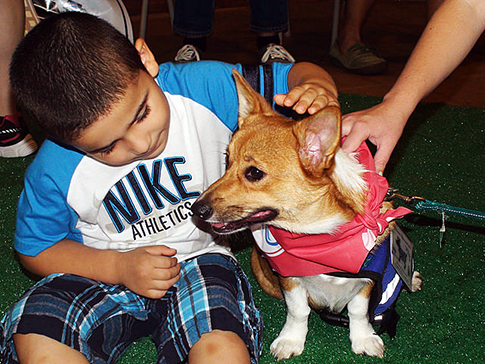
Above: Last year’s Juniata Spokesdog, Gracie, after winning the crown. Credit: PDE and Philadelphia Water.
It’s that time of year again, and two new neighborhoods are about to crown Philadelphia Water Spokesdogs.
For 2015, Fishtown and Washington Square West were selected as competing locales for the contest, which has been selecting a special pooch to spread the word about poo-lution since 2011. We’ll be accepting nominations for dogs from those neighborhoods through July 15. Guidelines and submission forms are available here. The Spokesdog program is held annually with the help of our friends at the Partnership for the Delaware Estuary.
As always, the goal is to raise awareness about keeping dog waste out of our waterways by getting it off sidewalks, streets and grass right away with proper disposal techniques. We all know it’s pretty gross (and rude!) when pet owners don’t clean up after their furry friends, but many people don’t think about the health consequences, especially as they relate to water.
When pet waste is left on the sidewalks, streets or other surfaces, it gets washed into street-level sewer intakes by rain and ends up in our creeks and rivers completely untreated. That can lead to the presence of dangerous germs and excess nutrients that make water unsafe for recreation and more expensive to treat.
Here's what the Environmental Protection Agency has to say about the impact of waste left behind by careless pet owners:
Decaying pet waste consumes oxygen and sometimes releases ammonia. Low oxygen levels and ammonia can damage the health of fish and other aquatic life. Pet waste carries bacteria, viruses, and parasites that can threaten the health of humans and wildlife. Pet waste also contains nutrients that promote weed and algae growth (eutrophication). Cloudy and green, eutrophic water makes swimming and recreation unappealing or even unhealthy.
As you can see, the environmental and public health threat is serious, and that's why we need a top-notch doggie to help show others the importance of bagging waste and putting it in a proper receptacle.
Typically, 30-80 dogs register in each neighborhood every year, so the competition is no joke. Of those, about a dozen dogs get selected for the doggie pageant, and best in show (determined with online votes in August) becomes Spokesdog.
With the crown come some real responsibilities—and some cool goodies.
Winning spokesdogs and their caretakers will attend at least three community events in 2015, distributing information on living the eco-friendly dog life. Small bag dispensers that clip to leashes and educational tipcards will be provided to hand out at these events. The educational tipcard explains how dog waste left on the ground breaks down and washes into local stormdrains every time it rains.
So, how about those prizes?
The 1st Place Spokesdog—“Philly Water’s Best Friend”—gets the following:
• $200 prize from a local business
• Image used in promotional pieces
• Toy & cookie prize pack
For the Runner Up (picked in case the 1st Place Spokesdog is unable to fulfill their duties):
• $50 prize from a local business
• Toy & cookie prize pack
All finalists in attendance at the awards ceremony will also receive a toy and cookie prize.
If you know of a worthy pup from Washington Square West or Fishtown, send in your application now and vote for them to become Philly famous!